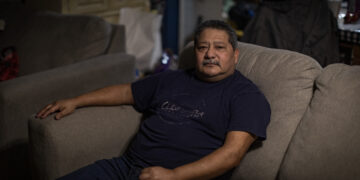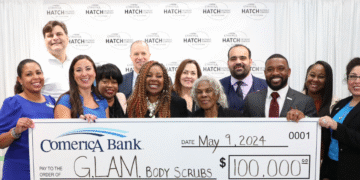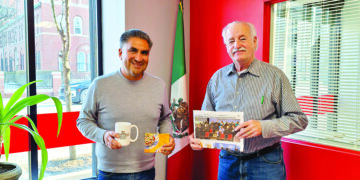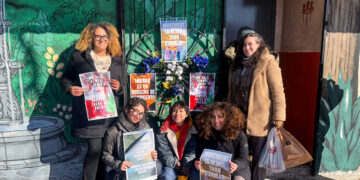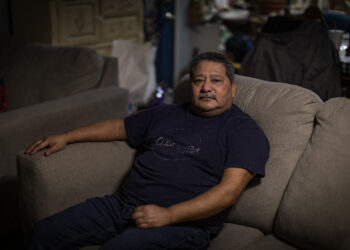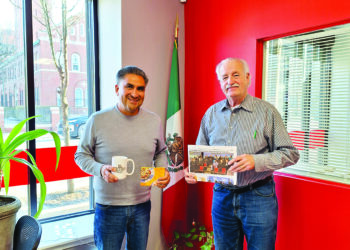Listen to this Article
Michigan Senator Elissa Slotkin visited CHASS Clinic on Thursday, August 14, during National Health Clinic Week, to honor the center’s 55th Anniversary as well as to present CHASS Board Chair Carmensita Buentello with a formal Certificate of Congratulations. The official U.S. Senate recognition certificate acknowledges the center’s decades of service as a community anchor providing healthcare and support to Detroit residents, especially those most in need. The award comes weeks after the center was honored with the Spirit of Detroit Award by District 6 City Councilmember Gabriela Santiago-Romero.
Standing in front of CHASS’s rooftop community garden at the end of her tour, Senator Slotkin found herself impressed with the facility’s offerings. “You have all the state-of-the-art medical things you would expect to see in a health facility, but then we’re standing right in front of a community garden where they grow their own food and teach nutrition classes across the hall,” she observed. “That is not a normal thing I’m used to seeing in a local hospital.”
Senator Slotkin also noted “We heard some amazing firsthand stories,” including from Buentello, who came to CHASS as an 18-year-old patient and now leads the institution as the first Latina woman to chair its board in the center’s 55-year history.
“I don’t get to cut you up in 40 pieces to send you to 50 clinics. You can get it all here,” explained Buentello about CHASS’s services. “It’s easy to just give a client a medication, whatever, but it takes more effort to ask that client, ‘Are you able to make ends meet? Are you being fed? Are you able to get your medications? Are your children in school?’” That wraparound approach to healthcare – where the whole person is treated, not just their symptoms – has defined CHASS for more than five decades and earned them the federal recognition Slotkin delivered last Thursday, but it came with a warning.

Senator Slotkin cautioned that CHASS now faces its biggest funding challenges in decades with cuts that could devastate community health centers across the country serving vulnerable populations. “Places like CHASS are significantly at risk,” the Senator explained. “They see a major underserved population. They see uninsured people. They serve a ton of people on Medicaid.”
New work requirements for SNAP benefits start this September, meaning some CHASS patients will discover their bridge cards don’t work at grocery store checkouts. Medicaid cuts could cost Michigan hospitals $6 billion over the next decade, according to the Michigan Hospital Association, forcing impossible choices about which services to maintain.
The ripple effects reach everyone, said Senator Slotkin. When more people lose insurance coverage, they still show up at hospitals during emergencies. Private insurers respond by raising rates on employer-provided plans — those notices are already going out for 10-17% increases starting January 1, 2026.
“Each organization that I visit, each hospital, they’re looking at which areas frankly bring in the fewest dollars, which serve the fewest people, and how do they make really difficult decisions on what to cut,” Slotkin said.
During her visit, Senator Slotkin met with CHASS leadership to strategize how they can work together to prevent as many cuts as possible. With Michigan’s state budget still unresolved and the requirement to pass a balanced budget, the pressure intensifies when federal dollars disappear — and as Senator Slotkin starkly noted, “Michigan state’s budget is 48% federal dollars.”
Despite the funding uncertainties ahead, CHASS’s commitment to Southwest Detroit remains unwavering. “We turn nobody away,” Buentello emphasized. “We help everyone. If you ask for help, we’re here to provide it.”
La Senadora Slotkin entrega reconocimiento federal a CHASS mientras se avecinan recortes de fondos
La senadora de Michigan, Elissa Slotkin, visitó la clínica CHASS el jueves 14 de agosto, durante National Health Clinic Week, para celebrar el 55º aniversario de la institución y entregar a la presidenta de la junta directiva, Carmensita Buentello, un Certificate of Congratulations. Este reconocimiento oficial del Senado de los Estados Unidos destaca las décadas de servicio de CHASS como un pilar comunitario que brinda atención médica y apoyo a los residentes de Detroit, en especial a quienes más lo necesitan. El homenaje llega pocas semanas después de que la clínica recibiera el Spirit of Detroit Award de parte de la concejal del Distrito 6, Gabriela Santiago-Romero.
Frente al huerto comunitario en la azotea de CHASS, al final de su recorrido, la senadora Slotkin se mostró sorprendida: “Ustedes tienen todo el equipo médico de última generación que se esperaría ver en un centro de salud, pero luego estamos parados justo frente a un huerto comunitario donde cultivan su propia comida y dan clases de nutrición al cruzar el pasillo,” observó. “Eso no es algo normal que yo esté acostumbrada a ver en un hospital local.”
La senadora también señaló: “Escuchamos historias increíbles de primera mano,” incluyendo la de Buentello, quien llegó a CHASS como paciente de 18 años y ahora dirige la institución como la primera mujer latina en presidir su junta en los 55 años de historia de la clínica.
“No tengo que partirte en 40 pedazos para mandarte a 50 clínicas. Aquí puedes recibirlo todo,” explicó Buentello sobre los servicios de CHASS. “Es fácil simplemente darle un medicamento a un cliente, lo que sea, pero toma más esfuerzo preguntarle a ese cliente: ‘¿Puede llegar a fin de mes? ¿Está comiendo? ¿Está pudiendo conseguir sus medicinas? ¿Sus hijos están en la escuela?’” Ese enfoque integral de la salud —donde se atiende a la persona completa y no solo a sus síntomas— ha definido a CHASS por más de cinco décadas y fue lo que les mereció el reconocimiento federal que Slotkin entregó el jueves. Pero la distinción vino acompañada de una advertencia.

La senadora Slotkin advirtió que CHASS enfrenta ahora sus mayores retos financieros en décadas, con recortes que podrían afectar gravemente a los centros de salud comunitarios de todo el país que atienden a poblaciones vulnerables.
“Lugares como CHASS están en un riesgo significativo,” explicó. “Atienden a una población con grandes carencias. Atienden a personas sin seguro. Atienden a muchísima gente con Medicaid.”
A partir de septiembre entrarán en vigor nuevos requisitos de trabajo para SNAP, lo que significa que algunos pacientes de CHASS descubrirán que sus Bridge Cards no funcionan en la caja del supermercado. Según la Asociación de Hospitales de Michigan, los recortes a Medicaid podrían costar a los hospitales del estado 6 mil millones de dólares en la próxima década, obligándolos a tomar decisiones imposibles sobre qué servicios mantener.
Los efectos repercuten en todos, señaló Slotkin. Cuando más personas pierden seguro médico, siguen llegando a los hospitales en emergencias. Las aseguradoras privadas responden aumentando las tarifas de los planes que ofrecen los empleadores: ya se están enviando avisos con aumentos de entre 10% y 17% a partir del 1 de enero.
“Cada organización que visito, cada hospital, está evaluando qué áreas, francamente, generan menos dinero, cuáles atienden a menos personas, y cómo toman decisiones realmente difíciles sobre qué recortar,” dijo Slotkin.
Durante su visita, la senadora se reunió con los líderes de CHASS para planear cómo trabajar juntos y evitar la mayor cantidad posible de recortes. Con el presupuesto estatal de Michigan aún sin resolverse y la obligación de aprobar un presupuesto equilibrado, la presión aumenta cuando desaparecen los fondos federales. Como recalcó Slotkin: “El presupuesto estatal de Michigan es 48% fondos federales.”
A pesar de las incertidumbres financieras, el compromiso de CHASS con el suroeste de Detroit sigue firme. “Aquí no rechazamos a nadie,” enfatizó Buentello. “Ayudamos a todos. Si alguien pide ayuda, aquí estamos para brindarla.”

